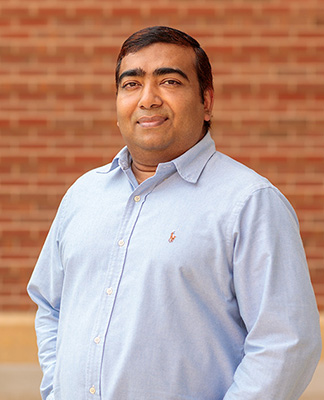Dec 21, 2023
Mukherjee selected as Fellow in OSF Faculty Fellowship Program
Gies faculty member Ujjal Mukherjee has been selected as a Fellow in the OSF Faculty Fellowship Program. Running January 15 through August 1, 2024, the program will connect Mukherjee with a team of operational and clinical personnel at OSF HealthCare, who will act as mentors and provide guidance as he works on a research project focusing on healthcare.

Mukherjee, an associate professor in the Department of Business Administration, will use the fellowship to examine ways of addressing inequalities in access to healthcare, particularly healthcare for chronic conditions. Chronic conditions (e.g., cardiovascular conditions, diabetes, COVID, cancer, and more) often have complexity that entails working with multiple specialists, treatments involving lifestyle changes, and ongoing monitoring. Monitoring, particularly, can require patients’ continued engagement with the remote monitoring digital technologies, which has been challenging.
“Chronic care delivery is important since a significant part of primary care capacity and a considerable part of healthcare costs go into delivering chronic care to a diverse and dispersed population,” Mukherjee said.
A number of factors – social, economic, and demographic – can adversely impact healthcare for some populations in the US. Particularly for chronic conditions, the gaps in health care are particularly prominent. Digital health technologies help provide improved access to healthcare resources such as doctors and nurses for remote populations, and regular monitoring of health status for dispersed patient populations by enabling continuous collection and analysis of health-related data.
Prior studies of digital technologies and healthcare have found that certain populations have either greater impediments to adopting and using the technology or a higher rate of discontinuing use or both. In particular, he and his team will be exploring the following questions:
- Does the adoption and usage of digital health platforms benefit different patient population groups characterized by access (geographic and affordability related) and sociodemographic characteristics (income, education, age, gender, and race)?
- What are the barriers to adoption, usage, and continuation of usage of digital health platforms for driving healthcare equity?
- Are there deployment strategies for digital health platforms that can improve health outcomes across patient communities?
“The focus of the fellowship and the project is to evaluate digital health technologies in healthcare delivery,” Mukherjee said. “One thing we will explore is an economic evaluation – cost-benefit – which is important from an adoption perspective. Additionally, understanding factors that are associated with meaningful use of these technologies is important for leveraging the promised benefits of these technologies. Finally, the healthcare delivery process-level integration of these various technologies into the ecosystem of healthcare delivery is crucial for the synergistic functioning of these technologies, which can transform healthcare delivery.”
Mukherjee will explore the use of digital technology to determine what impact it may have on closing the gap in healthcare access for underserved populations. Such technologies as telehealth and wearable devices have recently been used to address the gap in access to primary healthcare. These technologies can help with getting access to remote populations.
Working with Mukherjee on this project will be Sridhar Seshadri, the Alan J. and Joyce D. Baltz Endowed Professor and Professor of Business Administration at Gies, and Roopa Foulger, Vice President of Digital Innovation Development at OSF HealthCare. Mukherjee and Seshadri also have appointments with the Carle Illinois College of Medicine as Health Innovation Professors. As a Fellow, Mukherjee will have affiliate status at the Health Care Engineering Systems Center (HCESC) and will have access to center resources to support his collaboration with OSF.
Through these faculty fellowships and with the support of the Jump ARCHES program, OSF HealthCare and the University of Illinois Urbana-Champaign aim to develop and cultivate a cohort of faculty members with expertise in healthcare research and its translation to clinical practice and implementation. The program embeds UIUC faculty members with a clinical team at OSF HealthCare in Peoria, Illinois, and provides financial support to enable fellows to dedicate significant time to the development of a joint project with the potential for significant research and clinical impact.
“Access to the organizational expertise, processes, and data related to the adoption of these digital technologies at OSF will help my research in several ways,” Mukherjee said. “This fellowship will immensely help me advance my research on healthcare delivery to a diverse population.”
